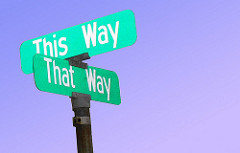The Paradox of Choice

Tools and ideas to transform education. Sign up below.
You are now subscribed
Your newsletter sign-up was successful
One of my favourite TED talks is Barry Schwartz’The Paradox of Choice. Schwartz makes the point that the choice isn’t always a good thing and that at some point too many choices is a bad as no choice at all. His theory is more involved than that but that idea in particular is intriguing.
Thinking about the big challenge of changing the learning landscape in our schools to acknowledge that the world around us has changed, is something that keeps many of us working tirelessly and often being frustrated with the results. Whether it’s a lack of resources, time, commitment or understanding, major barriers continue to exist that has meaningful change held at bay.
Research is pretty clear about the importance of choice, which leads to engagement, which leads to learning. Few would argue against this. I’m not sure I’ve seen any significant change or improvement happen when professionals aren’t given a choice. Professionals, by definition assume a level of expertise and suggest they are responsible for their own growth and development. Professional development that honors choice sees results. However in cultures that choose efficiency over emotion, often choice isn’t seen as essential and professionals get told what to do. What usually happens is that no matter what is told, professionals go back to their classrooms and do what they think is right regardless. We’ve been playing this game in education for a long time.
Those in authority and serious about reform and results focus on monitoring and accountability. They go in classrooms, to make sure teachers are doing their jobs. Not having been part of such a regime but hearing about it, I can’t imagine the morale and culture of these institutions being very inviting. Many will say, “we care about kids” which is often an excuse to treat adults unprofessionally and without care. I don’t think it matters if we work with students or adults. We don’t necessarily treat everyone equal but instead we treat them with the respect they deserve. Professionals deserve a level of respect that should allow them to be able to make choices.
And that’s the problem. As much as I would love to see all the teachers I work with make meaningful change to update their classrooms and curriculum to acknowledge that it’s 2011 and learning has changed, I respect the fact that teachers have choices. I can’t make them change. I don’t want to make the change. AsTschannen-Moransuggest,

Teachers do not resist making changes; they resist people who try to make them change. Once coaches abandon the role of change agent, we can build trust and rapport and engage teachers in nonjudgmental conversations about their experiences, feelings, needs, ambitions, and goals. (Evocative Coaching, page 6)
What’s really frustrating about that statement is that while it’s true, it takes a long time and in the end, there’s no guarantee it will turn out the way we as leaders hope. Some people like to think of themselves as change agents. Sounds like a nice thing but real change happens because we find strength and support to move forward with ideas we’ve adopted. Change agents, whatever they are, might be useful to plant a seed but that’s not the real change. I’ve planted my share of seeds but only in a few cases have I been able to participate directly with seeing teachers change. That’s because that kind of change requires an investment in time to develop and nurture supportive relationships.
Tools and ideas to transform education. Sign up below.
What a teacher does in their classroom everyday is directly related to their beliefs about learning. No amount of instruction or PD will matter unless a teacher wants to change. What we’re currently witnessing is pockets of change. Teachers, who for a variety of reasons are embracing what it means to learn today and are willing to make adjustments in their practice to make learning better for their students. Not always perfect but acting as professionals who are in charge of their own learning and understand their obligation to continually improve. They find support in various ways both online and locally. I doubtif any of these teachers were forced to change. They had choice. That’s both a great thing but also a frustrating thing. You may never see the change you’re so invested in if you allow teachers a choice. At the same time even if you had the authority and power to decree change, teachers won’t make those changes just because you tell them to change. Unless we strip teachers from their professional status, we’re going to have to face the dilemma of the paradox of choice. We can change curriculum and design environments and schedules that promote certain types of learning but as long we consider teachers professionals, for better or worse, they will operate as autonomous individuals. Create a culture where change, reflective and innovative practice is prized but allow teachers to make the choice that’s owed to them. In the jurisdictions where teachers are now beingtold precisely how to teach, I would argue they aren’t seen as professionals any longer. I have no faith that meaningful change will occur in such places.
I have no answers, I’m not asking for them. I’m going to continue to plant seeds and when and where I can, build the relationships and supports for those who have chosen to make a change.
Photo: http://www.flickr.com/photos/lori_greig/5331407245
